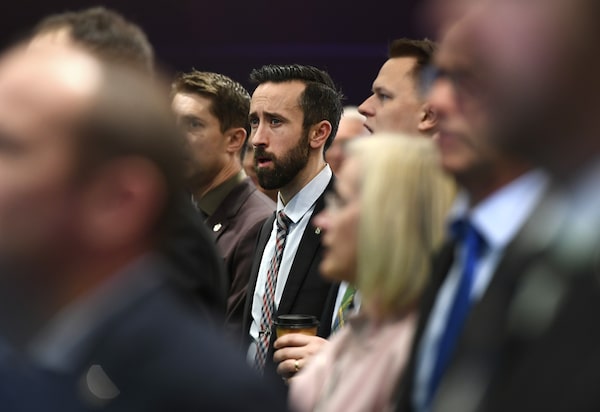
MP Derek Sloan attends a Conservative caucus retreat on Parliament Hill in Ottawa on Jan. 24, 2020.Justin Tang/The Canadian Press
Social-conservative activists are seeking to dominate this month’s Conservative policy convention by electing large numbers of anti-abortion delegates, which could undermine the leadership of Erin O’Toole.
The leaders of anti-abortion groups Campaign Life Coalition and RightNow have been active in nominating slates of candidates at the riding level.
“We’ve done very well,” Jeff Gunnarson, national president of Campaign Life Coalition, said in an interview. “We have over a thousand identifiable delegates” attending the convention, although he was unable to provide verification of that number.
There are about 4,000 delegate slots available at any Conservative policy convention, although fewer than the maximum invariably attend.
“I believe we have several hundred delegates from across the country,” said Alissa Golob, co-founder of the anti-abortion group RightNow, although it isn’t clear whether delegates recruited by one organization are counted in the others’ lists.
Independent MP Derek Sloan, who was expelled earlier this year from the Conservative caucus and party membership at Mr. O’Toole’s urging, said he was recruiting convention delegates both before and after his expulsion, and that “many, many hundreds” of delegates sympathetic to his causes have been nominated through this route.
Although the delegates are not able to control what motions are brought forward for debate, social conservatives hope to influence the selection of members of the National Council, which oversees electoral district associations (EDAs) and other aspects of party operations.
If social conservative activists do succeed in sending a larger-than-usual contingent to the policy convention, the COVID-19 pandemic will be at least partly responsible. Normally, delegates attend a policy convention largely at their own expense, which can run to several thousand dollars in airfare and hotel accommodation. Such delegates tend to have long-established ties to the party.
But restrictions on travel and public gatherings compelled the federal Conservatives to hold a virtual policy convention this year. Riding association annual general meetings have also been held virtually. This has made it easier, in both cases, for single-issue activists to organize and to vote for slates of delegates dedicated to their cause.
As well, some social conservatives are disappointed with Mr. O’Toole’s leadership. The Durham MP campaigned as a “true blue” alternative to the other leading candidate, Peter MacKay, who was a senior cabinet minister in Stephen Harper’s governments and who was seen as socially moderate. On the ranked ballot, many party members who had supported socially conservative candidates - Mr. Sloan and Toronto lawyer Leslyn Lewis - chose Mr. O’Toole over Mr. MacKay once the others were eliminated.
But having secured the leadership, Mr. O’Toole declared his strong support for abortion and LGBTQ rights. In January, in the wake of the attack on Capitol Hill and Liberal allegations of extremist elements within the Conservative movement, he issued a statement that said: “The Conservatives are a moderate, pragmatic, mainstream party – as old as Confederation – that sits squarely in the centre of Canadian politics. ... There is no place for the far right in our Party.”
As leader, “he’s ratcheted up his campaign against social conservative issues,” Mr. Gunnarson said.
Shortly after issuing that statement, Mr. O’Toole persuaded the Conservative caucus to expel Mr. Sloan, on the grounds that he had failed to detect that a prominent neo-Nazi had donated to his leadership campaign.
The expulsion of one of the party’s most socially conservative MPs “set a bad precedent,” Ms. Golob said. “People didn’t like that, including me.”
Cory Hann, communications director for the Conservative Party, said the party did not track the ideological makeup of delegates, but that organizers were encouraged by the numbers who would be attending virtually.
“We’re impressed with the amount of interest we’ve had in it from across the entire country,” he said. “We’re expecting this to be a record-setting convention.”
Asked about one wing or another of the party dominating the policy process, the chair of the Conservatives national policy committee said members overall reach a consensus on issues.
“There are going to be EDAs across the country that have a more social position and they will move social issues. There will be EDAs that move fiscal issues, but at the end of the day it is the members that decide,” Wayne Benson said in an interview.
David Tarrant, a communications adviser who served in the governments of Stephen Harper and Doug Ford, says Mr. O’Toole has the difficult challenge as leader to both unify the party and expand its reach. “Mr. O’Toole needs to create a unifying, values-driven message that will keep more people inside the tent,” he said, “without disqualifying the party as a viable option for a large number of people.”
Know what is happening in the halls of power with the day’s top political headlines and commentary as selected by Globe editors (subscribers only). Sign up today.
 John Ibbitson
John Ibbitson Ian Bailey
Ian Bailey